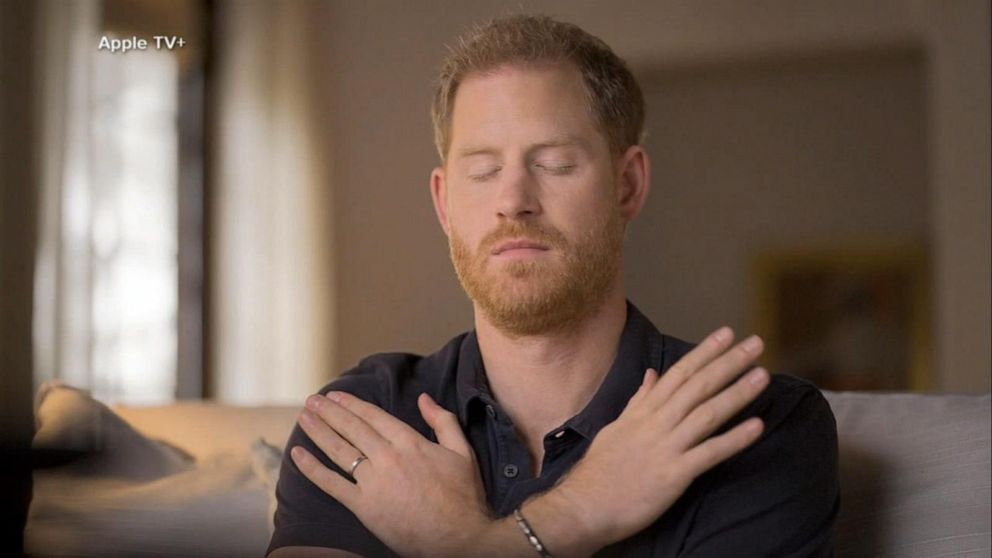The Apple+ docuseries The Me You Can’t See, has celebrities having open conversations about their life experiences, featuring guests such as Lady Gaga and Zak Williams, mental health advocate and the son of the late Robin Williams.
The show, which is also executive produced by Prince Harry and Oprah Winfrey, features the Duke of Sussex openly speaking about his mental health journey. Harry touched on the mental toll of losing his mother at a young age. He also shared how his wife, Meghan Markle, convinced him to start going to therapy.
Prince Harry’s Journey With Therapy
Unroyal vices

Prince Harry in The Me You Can’t See. Photograph: Apple/AP
Living in the public eye can be hard. It is especially hard when that very lifestyle played a significant role in your mother’s death. Therefore, Prince Harry recalling his days of using drugs and alcohol to dull his pain should come as no surprise.
“From 28 to 32 was a nightmare time in my life,” he said. “I was willing to drink, I was willing to take drugs, I was willing to try and do the things that made me feel less like I was feeling…I would find myself drinking not because I was enjoying it, but because I was trying to mask something,”
Of course, this didn’t help him feel any better. Turning to alcohol, drugs, food, or even sex will do nothing but worsen your already low mood.
Avoiding his triggers
Triggers refer to situations that may cause a person to relieve a traumatic experience that they’ve had. Triggers vary from person to person. However, common symptoms of being triggered include upset stomach, dizziness, sweaty palms, anxiety, and even anger.
For the sixth in line, the city where his mother lived before her death brought negative memories.
“London for me is a trigger because of what happened to my mum and because of what I experienced and what I saw,” says Harry. He adds that he even went as far as to suppress his thoughts of her so that he didn’t have to deal with the painful memory.
“I didn’t want to think about her because if I think about her, it’s going to bring out the fact that I can’t bring her back, and it’s just going to make me sad, and I just decided not to talk about it.”
Do I need therapy?
How does someone know if they need to seek out therapy? While there is no set list, there are a few behavioral changes that may indicate that you need someone to talk to. These include:

Photo by Alex Green from Pexels
- Using vices to cope
- Loss of interest in previously enjoyable activities
- Poor performance at work/school
- Having experienced trauma
- Disruption in sleep and/or eating patterns
- Feelings of hopelessness
- Consumed by thoughts
Prince Harry recognized his need for therapy after he and the former Suits actress got into an argument. Markle pointed out that her husband had a lot of unresolved anger that he needed to address, especially if he wanted their marriage to work.
“I quickly established that if this relationship [with Meghan Markle] was going to work, I was going to have to deal with my past. Because there was anger there. It wasn’t anger at her, it was just anger, and she recognised it.” Harry says on the show, “So, [I thought] ‘how do I fix this’? It was a case of, ‘you need to go back to the past, back to the point of trauma, deal with it, process it, and then move forward'”.
To address his trauma, Harry shares that he turned EMDR therapy. The technique helped him address the feelings he gets when he flies into London. According to him, he feels nervous, tense, and hollowed out. He thinks of being “hunted,” “helpless” and as though “there is no escape.”
What is EDMR therapy?
EMDR was developed by U.S. psychologist Francine Shapiro in the 1980s. According to Shapiro, during a walk in the park, she reckoned that her eye movements were helping to reduce the distress of her own traumatic memories. She tested this theory on others. Before long, she built up a standardized psychological therapy for treating people with traumatic memories.
Today, EDMR therapy is recommended by both, the National Institute for Health and Care Excellence, and the World Health Organization to help with post-traumatic stress disorder (PTSD). It’s also used to address other problems brought on by past trauma.
It should be noted that Harry did serve time in Afghanistan, so he likely has PTSD from that period of his life as well.
How does it work?
During a session, patients are asked to divide their attention, focusing on the bilateral stimulation at the same time as they are concentrating on the traumatic event. The purpose of the therapy isn’t to help you forget the memories, but rather to reduce the distress they cause. This is achieved by allowing the brain to process and store the memory normally.

Prince Harry/ABCNews
Inside Prince Harry’s Therapy Session
For the show, the 36-year-old royal agreed to be filmed during a therapy session. We see Harry with his arms crossed, as he taps his chest alternately on the left and right side to provide the stimulation.
Who can benefit from EMDR?
“EMDR is most suitable for people who have experienced a traumatic event or a series of traumatic events in their life,” explains Dr. Elena Touroni, consultant psychologist.“Normally people who meet the criteria for PTSD would be suitable candidates for EMDR, but it has also been shown to be a helpful therapy for people suffering from anxiety and panic disorder. However, more often than not, anxiety and panic disorder are a result of a traumatic experience.”

Photo by Alex Green from Pexels
Defeating the stigma
Harry’s candidness in recent months has helped break barriers in regards to mental health. For one, it helps to raise awareness about mental health. Additionally, Harry’s candidness sheds light on men’s mental health, a subject that is often stigmatized.
According to a study published in the American Journal of Men’s Health:
“mental health among men often goes untreated because they are far less likely to seek mental health treatment than women. Depression and suicide are ranked as a leading cause of death among men… Even with the various mental health treatment modalities available, there is a disproportionate difference between the number of males experiencing mental health disorders and those seeking treatment.”
“Stigma thrives on silence,” Harry says on the show. “So as long as it thrives on silence, the best that we can all do collectively is continue to talk and share stories that are so relatable to so many people around the world.”
Thankfully, Harry took the appropriate steps to address his issues, and it seems that his only regret is that he didn’t do it sooner:
“One of the biggest lessons that I’ve ever learned in life is you’ve sometimes got to go back and to deal with really uncomfortable situations and be able to process it in order to be able to heal,” he says.
Now, the ginger-haired royale is much happier with himself, and the memory of his mother:
“I’m living the life that she wanted to live for herself, the life that she wanted us to be able to live,” he said. “Not only do I know that she’s incredibly proud of me, but that she’s helped me get here.”

Omid Scobie/Twitter
References
Chatmon B. N. (2020). Males and Mental Health Stigma. American journal of men’s health, 14(4), 1557988320949322. https://doi.org/10.1177/1557988320949322





![women [longevity live]](https://longevitylive.com/wp-content/uploads/2020/01/photo-of-women-walking-down-the-street-1116984-100x100.jpg)









